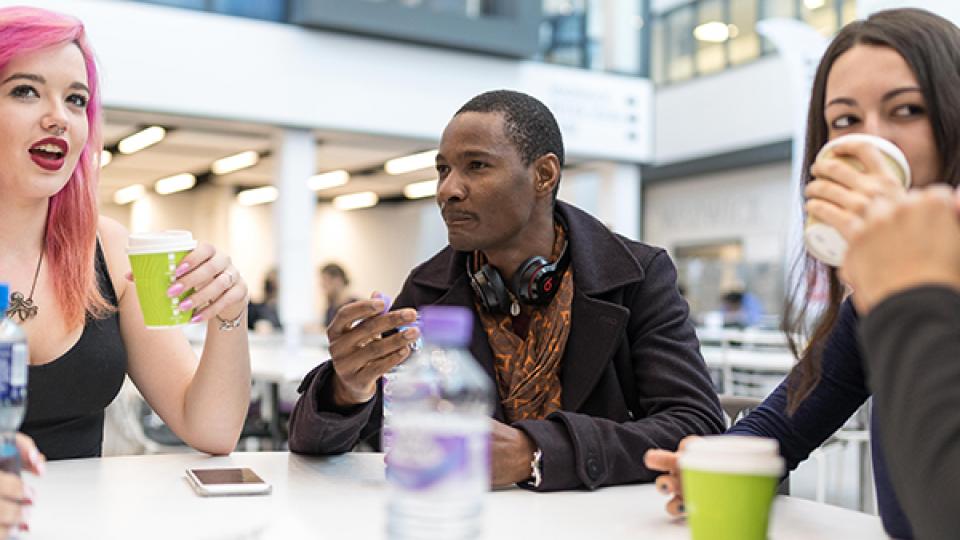
SummerFest
Do more with your summer break
Explore your opportunities throughout the summer to build connections with other students, develop skills and gain experience to support your continuing study and prepare you for the world of work. Keep an eye out for more future activities soon to be added.
Go to:
Future You: professional development
Take some time this summer to think about your future and all the things awaiting you beyond university. With career workshops, networking events and CV seminars, use this opportunity to plan ahead and build the foundation for becoming Future You.
LinkedIn Learning
LinkedIn Learning allows you to engage in self-study on a wide range of professional and academic skills. It also allows you to track your progress, and the platform will recommend other resources you may find useful based on the training you have engaged with.
These short videos are curated from LinkedIn Learning and are 3-7 minutes in length.
Summerfest activities
Student stories
Rebekah, BMus (Hons) Performance and Recording, gives us five great ideas for things to do in London during the summer. From free art galleries to sightseeing opportunities, there's something for everyone.
- Find out more about our student stories
Develop your study skills
You can continue developing your skills over the summer months to stay on track and get ahead for the new semester. This section brings together information, support and guidance for your academic studies to supplement the information you receive within your modules.
Returners Week workshops (June-September)
There are four Returners Weeks over the summer break, each of which focuses on a different theme. During these weeks, the Study Support Team will be offering a variety of online study skills workshops to help you reflect on previous semesters, set goals for improvement and prepare for the new year.
- Find out more below and get involved via the Study Support service login page
Further support
-
Skills for Study
Skills for Study is an online resource that can support you during your learning journey. Divided into six self-study modules including writing skills, time management, critical thinking skills and more, you can go through the material at your own pace on the topics most relevant to you.
Student life can be demanding with balancing the needs of academic work and other commitments. Your success as a student will be affected by how much time you spend in study and how well you use that time. Thoughtful planning and good time management skills can make a big difference to your experience.
Writing presents opportunities for you to explore topics in detail and express your own views. This module offers advice on writing in an academic style suitable for essays and assignments, and practical guidance on how to structure your ideas and improve your written work.
As you are exposed to new ideas and evidence, it becomes increasingly important to think critically about the information you are working with. This means questioning assumptions, evaluating the reliability of sources and evidence and comparing propositions. This module looks at what critical thinking is and how you can apply it to your learning.
- Find out more on the Skills for Study page
-
Video content study support
During the summer break, you can access a range of study support content to help you develop your skills and prepare your assignments for submission. From bitesize workshops to study skills guides, we have what you need to support you through the summer.
- Find out more via Blackboard
-
Perlego: a million books at your fingertips
One million ebooks are available to read via the Perlego ebook collection. The collection includes academic books as well as fiction books. Access is via your normal UWL student number and password.
- Find out more details about Perlego ebook collection and access your account
-
Personal tutor module
The personal tutoring module has been designed to support you alongside your university journey. There is a wealth of materials covering subjects such as managing work-life-study, time management, learning from feedback, developing critical and information literacy, and so much more.
- Check out the learning materials in this module via Blackboard
-
LibSearch
The digital library is open 24/7 all year round, giving you access to your e-books, journals, databases and specialist sources. Search for material using LibSearch.
- Visit the library homepage for more information and access LibSearch.
Watch our videos for support in using LibSearch and also putting together successful searches:
- Learn more about our LibSearch videos
- Learn more about searching videos
-
Functional Skills
Do you need your Maths or English qualification to meet your goals? If so, check out UWL's free Level 1 and Level 2 Functional Skills English and Maths courses.
Our Functional Skills Level 2 courses give you the equivalent of a grade C/4 at GCSE and are funded by the Greater London Authority Adult Education Budget.
Our courses are delivered online over 60 hours of live classes, with an in-person exam at the end of the course. Timetables vary, with some courses taking place during evenings and weekends and other taking place during the working day. We will be running courses regularly over the coming academic year.If you are interested in studying one of these course, you can check your eligibility, find out more and express your interest via the UWL website.
Eligible candidates will be invited to take an in-person pre-assessment to establish their current working level, after which they are invited to upcoming Level 1/Level 2 courses. The Functional Skills team will be running regular pre-assessment sessions over the summer.
For more information, please email functionalskills@uwl.ac.uk
Train to become a Peer Mentor
Peer Mentors play an important role in helping to enhance another student’s university experience. Mentoring is not only rewarding, but it can also support with your own development. Previous Peer Mentors have shared that their confidence has increased and their communication skills have improved as result of Peer Mentoring.
- Wednesday 21 August 2024, 10am - 12pm (online)
- Friday 30 August 2024, 2pm – 4pm (online)
Cost of living support
UWL is here to support you, and we recognise that the economic climate is currently making things extremely tough for students to make ends meet.
Working with UWLSU, departments across the university have identified ways we can support you at this challenging time – whether the support you need is connected to your finances, your wellbeing or simply ensuring you can access life’s essentials.









